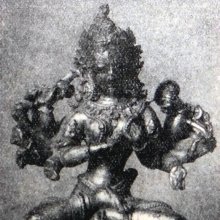Sattva, Sāttva, Shattva: 22 definitions
Introduction:
Sattva means something in Buddhism, Pali, Hinduism, Sanskrit, Marathi, Hindi. If you want to know the exact meaning, history, etymology or English translation of this term then check out the descriptions on this page. Add your comment or reference to a book if you want to contribute to this summary article.
Images (photo gallery)
In Hinduism
Natyashastra (theatrics and dramaturgy)
Source: Wisdom Library: Nāṭya-śāstraSattva (सत्त्व) refers to the “representation of the temperament”, according to the Nāṭyaśāstra chapter 24. There are eight aspects of the male’s sattva defined according to the science of sāmānyābhinaya, or “harmonious representation”.
- śobhā (brilliant character),
- vilāsa (graceful bearing),
- mādhurya (self-possession),
- sthairya (steadiness),
- gāmbhīrya (gravity),
- lalitā (sportiveness),
- audārya (nobility),
- tejas (spirit).
Sattva (सत्त्व) is something invisible; but it gives support to psychological states (bhāva) and Sentiments (rasa) by means of horripilation, tears and similar other sighs displayed in proper places and in harmony with the Sentiments to be produced. Sattva partakes of the nature of the body, and feeling (bhāva) arises from sattva, while its ordinary expression (hāva) from feeling, and its graceful expression (helā) from the ordinary one.
Sattva with excessive feeling (bhāva) manifests itself in relation to persons of the opposite sex. And the ordinary expression (hāva) should be marked as relating to its various conditions.

Natyashastra (नाट्यशास्त्र, nāṭyaśāstra) refers to both the ancient Indian tradition (shastra) of performing arts, (natya—theatrics, drama, dance, music), as well as the name of a Sanskrit work dealing with these subjects. It also teaches the rules for composing Dramatic plays (nataka), construction and performance of Theater, and Poetic works (kavya).
Ayurveda (science of life)
Source: Google Books: Essentials of AyurvedaSattva (सत्त्व, “psychic power”):—Sattva is of three types according to degree—superior, average and inferior which is decided on the basis of perseverance of the person.
Source: gurumukhi.ru: Ayurveda glossary of termsSattva (सत्त्व):—1. One of the three qualities (sattva, Rajas and Tamas) or constituents of everything in creation. 2. Mind, harmony, Natural character, inborn dispostion, Consicious mind, Being in existence

Āyurveda (आयुर्वेद, ayurveda) is a branch of Indian science dealing with medicine, herbalism, taxology, anatomy, surgery, alchemy and related topics. Traditional practice of Āyurveda in ancient India dates back to at least the first millenium BC. Literature is commonly written in Sanskrit using various poetic metres.
Dharmashastra (religious law)
Source: Wisdom Library: Dharma-śāstraSattva (सत्त्व).—One of the three guṇas, representing the quality of knowledge. These three qualities are to be seen as all-pervading and interpenetrating all beings. The Sanskrit word sattva is a technical term used throughout Dharmaśāstra literature such as the Manusmṛti.
According to the Manusmṛti XII.27: “Whenever one perceives in himself something full of bliss, calm and pure,—he should know it to be ‘sattva’”.
According to the Manusmṛti XII.31: “Vedic study, austerity, knowledge, purity, control over the organs, practice of virtue and meditation on the soul,—are the characteristics of the quality of ‘sattva’”.
According to the Manusmṛti XII.37: “When, however, the act is one which he wishes to understand in all its details, by doing which he does not feel ashamed, and by which his heart feels satisfied,—it is characterised by the quality of ‘sattva’”.

Dharmashastra (धर्मशास्त्र, dharmaśāstra) contains the instructions (shastra) regarding religious conduct of livelihood (dharma), ceremonies, jurisprudence (study of law) and more. It is categorized as smriti, an important and authoritative selection of books dealing with the Hindu lifestyle.
Yoga (school of philosophy)
Source: Srimatham: Mīmāṃsa: The Study of Hindu Exegesis (yoga)Sattva (सत्त्व).—According to Yoga, God is the perfect Guru untouched by any defect whatsoever. Scriptures are the proof for this; and Scriptures have their proof in the perfect quality of God’s sattva (principle of light and harmony). Both Scriptures and perfection are present in God’s sattva, and there is an eternal relation between the two. God having resolved to instruct all beings in right knowledge and Dharma composed the Scriptures, which are the expressions of God’s perfect thought.

Yoga is originally considered a branch of Hindu philosophy (astika), but both ancient and modern Yoga combine the physical, mental and spiritual. Yoga teaches various physical techniques also known as āsanas (postures), used for various purposes (eg., meditation, contemplation, relaxation).
Vyakarana (Sanskrit grammar)
Source: Shodhganga: Vaiyākaraṇabhūṣaṇasāra: a critical studySattva (सत्त्व).—An accomplished object; one of the three elements constituting all objects. The state of the predominance of sattva consists in masculineness, according to the Grammarians.
Source: Wikisource: A dictionary of Sanskrit grammarSāttva (सात्त्व).—Of a substantive, belonging to the object; cf. सत्त्वस्य इदम् । अपि वा मेदसश्च पशोश्च सात्त्वं द्विवचनं स्यात् । (sattvasya idam | api vā medasaśca paśośca sāttvaṃ dvivacanaṃ syāt |) Nir. VI. 16.

Vyakarana (व्याकरण, vyākaraṇa) refers to Sanskrit grammar and represents one of the six additional sciences (vedanga) to be studied along with the Vedas. Vyakarana concerns itself with the rules of Sanskrit grammar and linguistic analysis in order to establish the correct context of words and sentences.
General definition (in Hinduism)
Source: archive.org: A History of Indian PhilosophyThere are three kinds of morbid elements (doṣa) of the body, viz. vāta, pitta and śleṣman , and two morbid elements which affect the mind (sattva), viz. rajas and tamas. By the disorder of the first three the body becomes diseased, and by that of the second two the mind becomes affected.
Source: WikiPedia: Hinduism1) In Vedic philosophy, sattva ("purity", "existence, reality"; adjectival sāttvika "pure") is the most rarefied of the three gunas in Samkhya, sāttvika "pure", rājasika "excitable", and tāmasika "indifferent". Importantly, no value judgement is entailed as all guna are indivisible and mutually qualifying.
2) Sattva encompasses qualities of goodness, light, and harmony. According to the Yoga Vasistha, people who are of a sattvic nature and whose activities are mainly based on sattva, will tend to seek answers regarding the origin and truth of material life. With proper support they are likely to reach liberation.
In Buddhism
Mahayana (major branch of Buddhism)
Source: Wisdom Library: Maha Prajnaparamita SastraSattva (सत्त्व) according to the 2nd century Mahāprajñāpāramitāśāstra (chapter VII).—“Bodhi is the path of the Buddhas (buddhamārga); Sattva is either a being or a great mind. The Bodhisattva is the being who is going to obtain the mind, indestructible (aheya) and infrangible (acyuta) like a diamond mountain (vajra-parvata), of the qualities (guṇa) of the path of the Buddhas. Such is the great mind”.
Furthermore, sat means to praise (stava) the holy Dharma, tva means the essential nature of the holy Dharma. The Bodhisattva is so called because his mind is beneficial to himself and to others, because he saves all beings, because he knows the true nature of all dharmas, because he travels the Path of supreme perfect enlightenment and because he is praised by all the Āryas.

Mahayana (महायान, mahāyāna) is a major branch of Buddhism focusing on the path of a Bodhisattva (spiritual aspirants/ enlightened beings). Extant literature is vast and primarely composed in the Sanskrit language. There are many sūtras of which some of the earliest are the various Prajñāpāramitā sūtras.
Languages of India and abroad
Marathi-English dictionary
Source: DDSA: The Aryabhusan school dictionary, Marathi-Englishsattva (सत्त्व).—n The 1st of the three guṇa of created things-the property of goodness. Being, existence. reality. A substance, an entity. Cream, pith, marrow, essence. Vigour, spirit, strength. sattva ghēṇēṃ Try the goodness of, try the stuff or materials (of a thing, person). sattva sōḍaṇēṃ Drop, cast or lose its vigour, virtue, potency, &c sattvāsa jāgaṇēṃ Preserve in full lite and vigorours operation, one's virtue, spirit, moral goodness &c.
Marathi is an Indo-European language having over 70 million native speakers people in (predominantly) Maharashtra India. Marathi, like many other Indo-Aryan languages, evolved from early forms of Prakrit, which itself is a subset of Sanskrit, one of the most ancient languages of the world.
Sanskrit dictionary
Source: DDSA: The practical Sanskrit-English dictionarySattva (सत्त्व).—[sato bhāvaḥ] (Said to be m. also in the first ten senses)
1) Being, existence, entity.
2) Nature, essence.
3) Natural character, inborn disposition; अच्योष्ट सत्त्वान्नृपतिश्च्युताशः (acyoṣṭa sattvānnṛpatiścyutāśaḥ) Bhaṭṭikāvya 3.2.
4) Life, spirit, breath, vitality, principle of vitality; उद्गतानीव सत्त्वानि बभूवुरमनस्विनाम् (udgatānīva sattvāni babhūvuramanasvinām) Rām.2.48.2; चित्रे निवेश्य परिकल्पित- सत्त्वयोगा (citre niveśya parikalpita- sattvayogā) Ś.2.1.
5) Consciousness, mind, sense; वाक्च सत्वं च गोविन्द बुद्धौ संवेशितानि ते (vākca satvaṃ ca govinda buddhau saṃveśitāni te) Mahābhārata (Bombay) 12.46.4; Bhagavadgītā (Bombay) 16.1; Bhāgavata 7.15.41.
6) An embryo.
7) Substance, thing, wealth.
8) An elementary substance such as earth, air, fire &c.
9) (also m.) A living or sentient being, animal, beast; वन्यान् विनेष्यन्निव दुष्टसत्त्वान् (vanyān vineṣyanniva duṣṭasattvān) R.2.8;15.15; किं नोऽपत्यनिर्विशेषाणि सत्वानि विप्रकरोषि (kiṃ no'patyanirviśeṣāṇi satvāni viprakaroṣi) Ś7; Mālatīmādhava (Bombay) 9; यश्चासूनपि संत्यजेत् करुणया सत्त्वार्थमभ्युद्यतः (yaścāsūnapi saṃtyajet karuṇayā sattvārthamabhyudyataḥ) Nāg.2.1.
1) An evil spirit, a demon, ghost; अद्य नूनं दशरथः सत्त्वमाविश्य भाषते (adya nūnaṃ daśarathaḥ sattvamāviśya bhāṣate) Rām.2.33.1.
11) Goodness, virtue, excellence.
12) Truth, reality, certainty.
13) Strength, energy, courage, vigour, power, inherent power, the stuff of which a person is made; निजमेव सत्त्वमुपकारि साम् (nijameva sattvamupakāri sām) Kirātārjunīya 18. 14; Mahābhārata (Bombay) 12.313.17; क्रियासिद्धिः सत्त्वे भवति महतां नोपकरणे (kriyāsiddhiḥ sattve bhavati mahatāṃ nopakaraṇe) Subhāṣ.; R.5.31; Mu.3.22.
14) Wisdom, good sense.
15) The quality of goodness or purity regarded as the highest of the three Guṇas q. v.; (it is said to predominate most in gods and heavenly beings).
16) A natural property or quality, characteristic.
17) A noun, substantive.
18) Intellect (buddhi); अघ्राणमवितर्कं च सत्त्वं प्रविशते परम् (aghrāṇamavitarkaṃ ca sattvaṃ praviśate param) Mahābhārata (Bombay) 12.24.18.
19) The subtle body of individual soul (liṅgaśarīra); गृहाणीव हि मर्त्यानामाहुर्देहानि पण्डिताः । कालेन विनियुज्यन्ते सत्त्वमेकं तु शाश्वतम् (gṛhāṇīva hi martyānāmāhurdehāni paṇḍitāḥ | kālena viniyujyante sattvamekaṃ tu śāśvatam) || Mahābhārata (Bombay) 11.3.8.
Derivable forms: sattvam (सत्त्वम्).
Source: Cologne Digital Sanskrit Dictionaries: Shabda-Sagara Sanskrit-English DictionarySattva (सत्त्व).—n.
(-ttvaṃ) 1. One of the three Gunas or properties of man and nature; the quality of excellence or goodness: that which enlightens, constitutes knowledge, and is the cause of truth, and the predominance of which renders the person, in whom it resides, virtuous, gentle, devout, charitable, chaste, honest, &c., and the thing, pure, mild, &c. 2. Substance, thing, either elementary substance, as, earth, air fire, &c., or anything of which some property may be predicated. 3. Mind, intellect. 4. Nature, natural, property or disposition. 5. Vigour, power. 6. Strength. 7. Self-possession or command. 8. Breath. 9. Being, existence. 10. Essence, substance. 11. Wealth. 12. Certainty. 13. Life, the principle of being. 14. A substantive, noun. 15. A demon, a goblin. mn.
(-ttvaḥ-ttvaṃ) 1. An animal, a being. 2. An embryo. E. ṣad to perish, aff. tvat; or sat being, good, excellent, &c., tva aff. of the abstract: one ta being rejected also, it is read satva .
Source: Cologne Digital Sanskrit Dictionaries: Benfey Sanskrit-English DictionarySattva (सत्त्व).—i. e. sant (ptcple. pres. of 1. as), + tva, I. m. and n. 1. An animal, [Pañcatantra] 69, 5 (n.); [Hitopadeśa] 56, 20; [Lassen, Anthologia Sanskritica.] 2. ed. 44, 3 (m.); a beast, [Raghuvaṃśa, (ed. Stenzler.)] 15, 15; a monster, [Rāmāyaṇa] 1, 40, 20. 2. A being, [Pañcatantra] 165, 9; [Rāmāyaṇa] 3, 55, 48 (n.). Ii. n. 1. Being, existence. 2. Life, [Śākuntala, (ed. Böhtlingk.)] [distich] 42. 3. Nature, natural property, [Hitopadeśa] ii. [distich] 39; character, 100, 6. 4. Essence, true essence, [Bhagavadgītā, (ed. Schlegel.)] 2, 45; 10, 36. 5. Certainty, [Vedāntasāra, (in my Chrestomathy.)] in
Ṣaṭtva (षट्त्व).—[neuter] the number six.
--- OR ---
Sattva (सत्त्व).—[neuter] being, existence, reality, nature, character; firmness, resolution, energy, courage; goodness (ph.); spiritual or intellectual being, spirit or vital. breath; real being, thing, object; (also [masculine]) living or sentient being, [especially] animal, beast; phantom, spectre, imp, goblin.
Source: Cologne Digital Sanskrit Dictionaries: Monier-Williams Sanskrit-English Dictionary1) Ṣaṭtva (षट्त्व):—[=ṣaṭ-tva] [from ṣaṭ > ṣaṣ] n. a hexade [vArttika] on [Pāṇini 5-2, 29.]
2) Sattva (सत्त्व):—[=sat-tva] [from sat] a See below.
3) [=sat-tva] [from sat] b n. (ifc. f(ā). ) being, existence, entity, reality (īśvara-s, ‘the existence of a Supreme Being’), [Taittirīya-saṃhitā]etc. etc.
4) [v.s. ...] true essence, nature, disposition of mind, character, [Pañcaviṃśa-brāhmaṇa; Mahābhārata] etc.
5) [v.s. ...] spiritual essence, spirit, mind, [Muṇḍaka-upaniṣad; Yājñavalkya; Mahābhārata; Bhāgavata-purāṇa]
6) [v.s. ...] vital breath, life, consciousness, strength of character, strength, firmness, energy, resolution, courage, self-command, good sense, wisdom, magnanimity, [Mahābhārata; Rāmāyaṇa] etc.
7) [v.s. ...] the quality of purity or goodness (regarded in the Sāṃkhya [philosophy] as the highest of the three Guṇas [q.v.] or constituents of Prakṛti because it renders a person true, honest, wise etc., and a thing pure, clean etc.), [Maitrī-upaniṣad; Manu-smṛti; Yājñavalkya] etc., [Mahābhārata; Rāmāyaṇa]
8) [v.s. ...] material or elementary substance, entity, matter, a thing, [Nirukta, by Yāska; Prātiśākhya]
9) [v.s. ...] a substantive, noun, [Horace H. Wilson]
10) [v.s. ...] m. n. a living or sentient being, creature, animal, [Manu-smṛti; Mahābhārata] etc.
11) [v.s. ...] m. embryo, fetus, rudiment of life (See -lakṣaṇā)
12) [v.s. ...] a ghost, demon, goblin, monster, [Rāmāyaṇa; Varāha-mihira’s Bṛhat-saṃhitā; Kathāsaritsāgara]
13) [v.s. ...] Name of a son of Dhṛta-rāṣṭra, [Mahābhārata]
14) [=sat-tva] c See p. 1135, col. 2.
15) Sāttva (सात्त्व):—mfn. ([from] sat-tva) relating to the quality Sattva etc., [Mārkaṇḍeya-purāṇa]
Source: Cologne Digital Sanskrit Dictionaries: Yates Sanskrit-English DictionarySattva (सत्त्व):—(ttvaṃ) 1. n. Existence, reality; life, breath, mind; substance, wealth; natural quality or power; vigor; self-possession; the quality of truth and genuine goodness. m. n. Animal being.
Source: DDSA: Paia-sadda-mahannavo; a comprehensive Prakrit Hindi dictionary (S)Sattva (सत्त्व) in the Sanskrit language is related to the Prakrit word: Satta.
[Sanskrit to German]
Sanskrit, also spelled संस्कृतम् (saṃskṛtam), is an ancient language of India commonly seen as the grandmother of the Indo-European language family (even English!). Closely allied with Prakrit and Pali, Sanskrit is more exhaustive in both grammar and terms and has the most extensive collection of literature in the world, greatly surpassing its sister-languages Greek and Latin.
Hindi dictionary
Source: DDSA: A practical Hindi-English dictionarySattva (सत्त्व):—(nm) being, existence; entity; reality; substance; spiritual essence, quintessence; strength, vitality; quality of purity and goodness; —[guṇa] the quality of purity and goodness; ~[hīna] devoid of [sattva].
...
Kannada-English dictionary
Source: Alar: Kannada-English corpusSattva (ಸತ್ತ್ವ):—
1) [noun] strength, energy.
2) [noun] the quality of purity or goodness.
3) [noun] being; existence; entity.
4) [noun] vital breath; life.
5) [noun] a material or elementary substance.
6) [noun] the essence or pith of things.
7) [noun] the true essence, nature or disposition of a thing or person.
8) [noun] the disembodied spirit; a ghost.
9) [noun] spiritual essence; spirit; mind.
10) [noun] the quality or fact of being conscious; consciousness.
11) [noun] any of the five elements (which make the physical world and the objects therein.
12) [noun] any living being.
13) [noun] the unborn young in its initial stage, growing in the uterus of its mother; a foetus.
14) [noun] wisdom; sagacity.
15) [noun] (gram.) a noun; a substantive.
Kannada is a Dravidian language (as opposed to the Indo-European language family) mainly spoken in the southwestern region of India.
See also (Relevant definitions)
Starts with (+85): Sattvabharata, Sattvabhava, Sattvaci Canguna, Sattvaci Savitri, Sattvaci-canguna, Sattvadhaman, Sattvadhatu, Sattvadhika, Sattvadhina, Sattvadhira, Sattvagaganachittapratibhasabimba, Sattvagaganacittapratibhasabimba, Sattvaguna, Sattvaguni, Sattvagunin, Sattvahani, Sattvahara, Sattvaharana, Sattvahina, Sattvahrid.
Ends with (+68): Abalasattva, Abhrakasattva, Adinasattva, Adrishtasattva, Agadhasattva, Alpasattva, Antahsattva, Antarabhavasattva, Apannasattva, Arangisattva, Asamjnikasattva, Asamjnisattva, Asangisattva, Asattva, Ashokasattva, Ashtabodhisattva, Atibodhisattva, Bahisattva, Bahusattva, Bhirusattva.
Full-text (+892): Sattvaguna, Bodhisattva, Sattvasamshuddhi, Sattvavihita, Sattvasampanna, Sattvika, Sattvastha, Sattvatman, Adinasattva, Sattvotsaha, Sattvodreka, Sattvahara, Sattvaviplava, Sattvasarga, Sattvadhatu, Sattvadhaman, Sattvata, Sattvavati, Mahasattva, Asattva.
Relevant text
Search found 180 books and stories containing Sattva, Ṣaṭ-tva, Sat-tva, Sāttva, Ṣaṭtva, Shat-tva, Shattva; (plurals include: Sattvas, tvas, Sāttvas, Ṣaṭtvas, Shattvas). You can also click to the full overview containing English textual excerpts. Below are direct links for the most relevant articles:
Shrimad Bhagavad-gita (by Narayana Gosvami)
Verse 10.36 < [Chapter 10 - Vibhūti-yoga (appreciating the opulences of the Supreme Lord)]
Verse 10.41 < [Chapter 10 - Vibhūti-yoga (appreciating the opulences of the Supreme Lord)]
Verse 14.11 < [Chapter 14 - Guṇa-traya-vibhāga-yoga]
Garga Samhita (English) (by Danavir Goswami)
Verse 1.6.29 < [Chapter 6 - Description of Kaṃsa’s Strength]
Verse 8.13.115 < [Chapter 13 - A Thousand Names of Lord Balarāma]
Verse 5.18.8 < [Chapter 18 - Uddhava Hears the Gopīs’ Words and Returns to Mathurā]
Vivekachudamani (by Shankara)
Brihad Bhagavatamrita (commentary) (by Śrī Śrīmad Bhaktivedānta Nārāyana Gosvāmī Mahārāja)
Verse 1.3.65 < [Chapter 3 - Prapañcātīta (beyond the Material Plane)]
Verse 2.2.88 < [Chapter 2 - Jñāna (knowledge)]
Verse 1.2.33-34 < [Chapter 2 - Divya (the celestial plane)]
Amarakoshodghatana of Kshirasvamin (study) (by A. Yamuna Devi)
Philosophy (1): Some concepts of Sāṅkhyā philosophy < [Chapter 4 - Cultural Aspects]
Philosophy (3): Nyāya and Vaiśeṣika < [Chapter 4 - Cultural Aspects]
Position of Women < [Chapter 3 - Social Aspects]
Manusmriti with the Commentary of Medhatithi (by Ganganatha Jha)
Verse 12.27 < [Section VII - The Three Guṇas]
Verse 12.24 < [Section VII - The Three Guṇas]
Verse 12.26 < [Section VII - The Three Guṇas]
Related products







